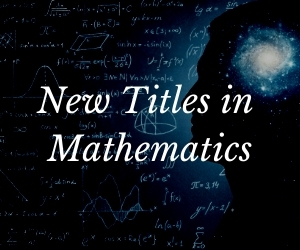System Upgrade on Tue, May 28th, 2024 at 2am (EDT)
Existing users will be able to log into the site and access content. However, E-commerce and registration of new users may not be available for up to 12 hours.For online purchase, please visit us again. Contact us at customercare@wspc.com for any enquiries.
"The collection transcends the traditional institutional division lines (private, public, large, small, research, undergraduate, etc.) and has something to offer for readers in every realm of academia. The collection challenges the reader to think about how to implement and improve undergraduate research experiences, what such experiences mean to students and faculty, and how such experiences can take a permanent place in the modern preparation of undergraduate mathematics and STEM majors. The book is an open invitation to learn about what has worked and what hasn’t in the inspiration, and has the potential to ignite initiatives with long-lasting benefits to students and faculty nationwide." See Full Review
“The US National Science Foundation (NSF) Research Experiences for Undergraduates (REU) program in mathematics is now 25 years old, and it is a good time to think about what it has achieved, how it has changed, and where this idea will go next.”
This was the premise of the conference held at Mt. Holyoke College during 21–22 June, 2013, and this circle of ideas is brought forward in this volume. The conference brought together diverse points of view, from NSF administrators, leaders of university-wide honors programs, to faculty who had led REUs, recent PhDs who are expected to lead them soon, and students currently in an REU themselves. The conversation was so varied that it justifies a book-length attempt to capture all that was suggested, reported, and said. Among the contributors are Ravi Vakil (Stanford), Haynes Miller (MIT), and Carlos Castillo-Chavez (Arizona, President's Obama Committee on the National Medal of Science 2010–2012).
This book should serve not only as a collection of speakers' notes, but also as a source book for anyone interested in teaching mathematics and in the possibility of incorporating research-like experiences in mathematics classes at any level, as well as designing research experiences for undergraduates outside of the classroom.
Sample Chapter(s)
Chapter 1: Undergraduate Research and the Mathematics Profession (140 KB)
Chapter 4: REUs with Limited Faculty Involvement, "Underrepresented" Subjects in the Undergraduate Curriculum, and the Culture of Mathematics (140 KB)
Contents:
- Undergraduate Research and the Mathematics Profession (Donal O'Shea)
- FURST — A Symbiotic Approach to Research at Primarily Undergraduate Institutions (Tamás Forgács)
- A Laboratory Course in Mathematics (Kathy Lin and Haynes Miller)
- REUs with Limited Faculty Involvement, "Underrepresented" Subjects in the Undergraduate Curriculum, and the Culture of Mathematics (Yanir A Rubinstein and Ravi Vakil)
- The Berkeley Summer Research Program for Undergraduates: One Model for an Undergraduate Summer Research Program at a Doctorate-Granting University (Daniel Cristofaro-Gardiner)
- Fifteen Years of the REU and DRP at the University of Chicago (J Peter May)
- Why REUs Matter (Carlos Castillo-Garsow and Carlos Castillo-Chavez)
- Integrating Mathematics Majors into the Scientific Life of the Country (William Yslas Vélez)
- The Gemstone Honors Program: Maximizing Learning Through Team-based Interdisciplinary Research (Frank J Coale, Kristan Skendall, Leah Kreimer Tobin and Vickie Hill)
- The Freshman Research Initiative as a Model for Addressing Shortages and Disparities in STEM Engagement (Josh T Beckham, Sarah L Simmons, and Gwendolyn M Stovall)
- Determining the Impact of REU Sites in the Mathematical Sciences (Jennifer Slimowitz Pearl)
- The Mathematics REU, New Directions: A Conference at Mount Holyoke College, June, 2013 (Giuliana Davidoff, Mark Peterson, Margaret Robinson and Yanir A Rubinstein)
Readership: Undergraduates, practitioners and teachers in mathematics.






















